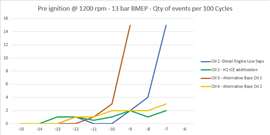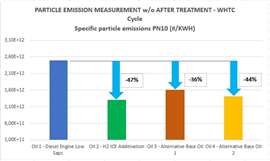Research explores key lubricant parameters for H2 engines
30 October 2023
 The TotalEnergies Lubricant Research Center is investigating the role of lubricants in the development and operation of the H2 combustion engine. (Photo: TotalEnergies)
The TotalEnergies Lubricant Research Center is investigating the role of lubricants in the development and operation of the H2 combustion engine. (Photo: TotalEnergies)
The transportation industry has set important objectives to reduce greenhouse gas emissions. Among alternative energy sources, hydrogen produced from low carbon pathways has been intensively studied within the industry and supported by public policies.
Hydrogen-fueled internal combustion engines (ICE) can represent an interesting and complementary solution to power transportation and off-road equipment and accelerate the transition toward green mobility. On the one hand, hydrogen combustion properties offer the possibility to adjust internal combustion performance to meet technical and regulatory requirements expected by the market. On the other hand, the same combustion properties are raising important questions on the lubrication system requirements to ensure a reliable and efficient operation of hydrogen-fueled ICE in the field.
Over the past three years, the TotalEnergies Lubricant Research Center has been investigating the role of lubricants in the development and operation of the H2 combustion engine. Several test campaigns, using different hardware – a research single-cylinder and several light- and heavy-duty multi-cylinders – have been carried out to understand the constraints of this technology, and to define the areas in which lubricants can provide an advantage for engine performance or reliability.
Totalenergies has identified the key parameters to be considered for engine and lubricant optimization.
Performance
Hydrogen requires very little energy to ignite. Pre-ignition in the combustion chamber must be avoided in all circumstances, as this could cause serious damage to the engine’s mechanical components. This phenomenon occurs during high-load operating phases, or during transient phases. To guarantee high performance without risk, this parameter must be kept under control. Lubricants have been identified as a possible factor in this phenomenon.
 Source: TotalEnergies
Source: TotalEnergies
TotalEnergies conducted pre-ignition tests on a 7.7 L, six-cylinder H2 engine with double stage turbocharger and port fuel injection over more than 500 hours. This allowed the company to identify the oil formulation that can significantly reduce the risk of pre-ignition under the most severe conditions.
The use of oils specifically formulated for H2 engines (curves 2 and 4) significantly reduces the amount of pre-ignition compared with those observed with low SAPS diesel oil (curve 1).
Emissions
Hydrogen combustion is clean, producing only water. The only pollutant emissions produced by H2 ICE are those caused by the combustion of the lubricating oil. This combustion results in very low CO2 and particulate emissions. Nevertheless, these engines are developed with the aim of claiming zero emissions, so this situation must not persist.
 Source: TotalEnergies
Source: TotalEnergies
Here, too, the emissions measurements carried out on multi-cylinder H2 engines with oils developed by TotalEnergies show a significant reduction (up to -45%) in particulate emission.
A specific formulation of H2 ICE oil, or the use of alternative base oil, allows a substantial decrease in particulate emissions compared to diesel engine oil.
Reliability
The water produced by hydrogen combustion is transported through the rings and cylinders and the blow-by circuit. After a few hours of operation, this “combustion water” comes in contact with the lubricating oil. Operating conditions at low load, or intermittently, are favorable to increasing the amount of water in contact with the lubricant. This can jeopardize engine reliability.
These conditions are challenging. Lubricant must retain its lubricating properties, keep viscosity grade, protect components against corrosion, and all this over a wide temperature range.
Several formulations that will enable the lubricant to absorb large volumes of water are currently being tested, considering the above parameters, in the Totalenergies research center.
TotalEnergies Lubrifiant is convinced that H2 ICE technology meets the needs of certain applications, where robustness, rapid refueling and the ability to ensure long hours of intense work are required. To support the development of this technology, the company is continuing its research to offer manufacturers and users lubricants adapted to H2 engines, ensuring optimal performance and reliability conditions.
This article was provided by TotalEnergies, a global energy company that produces and markets a diverse energy portfolio: oil and LNG, low-carbon energies, electricity and renewables.
STAY CONNECTED




Receive the information you need when you need it through our world-leading magazines, newsletters and daily briefings.
POWER SOURCING GUIDE
The trusted reference and buyer’s guide for 83 years
The original “desktop search engine,” guiding nearly 10,000 users in more than 90 countries it is the primary reference for specifications and details on all the components that go into engine systems.
Visit Now
CONNECT WITH THE TEAM









